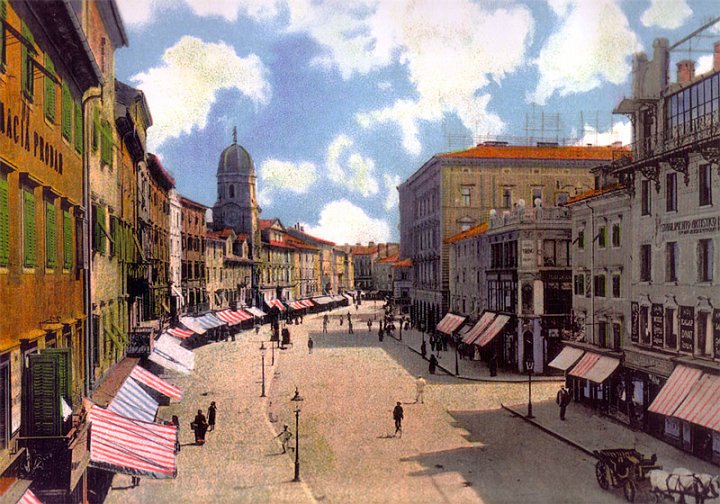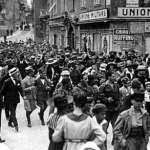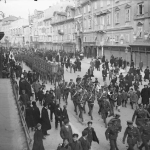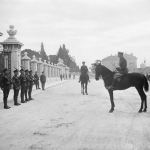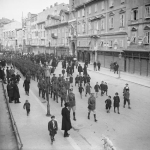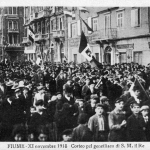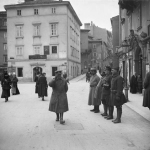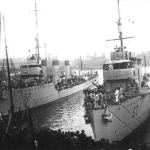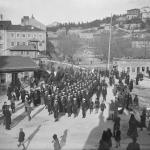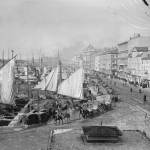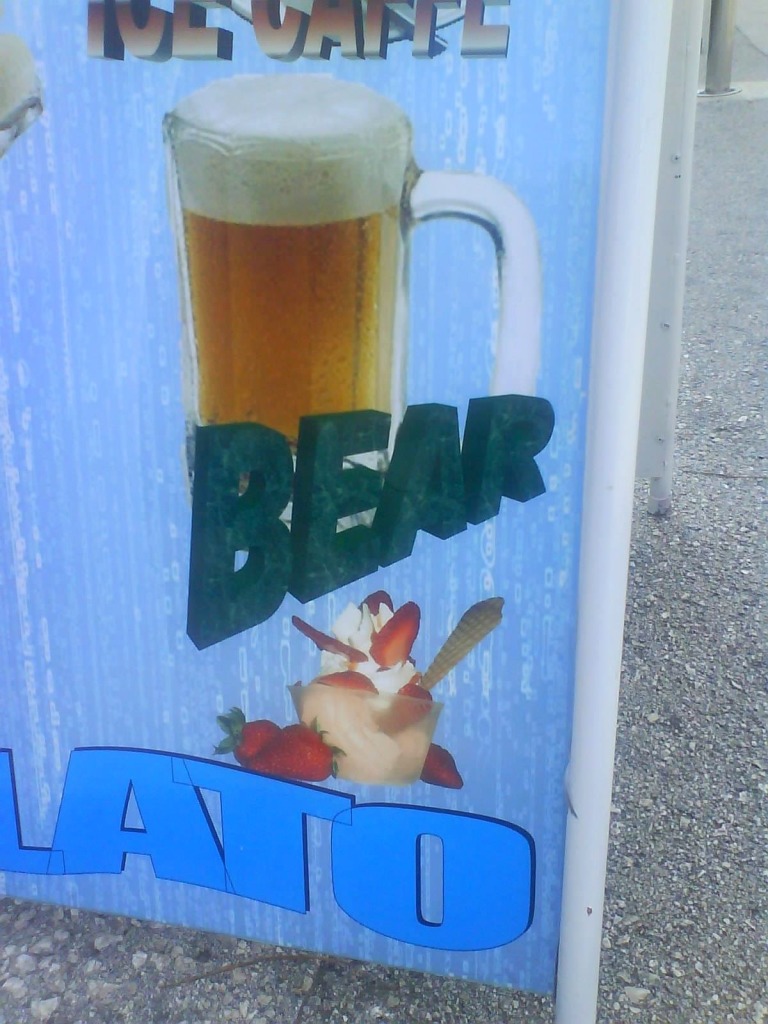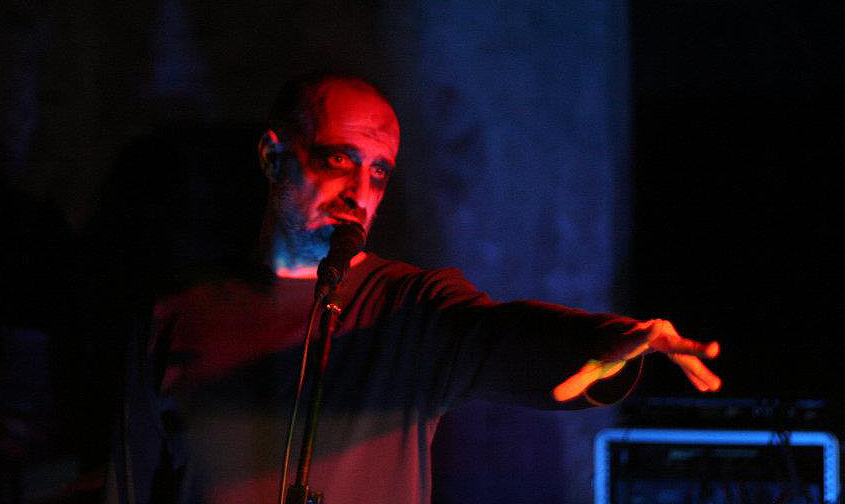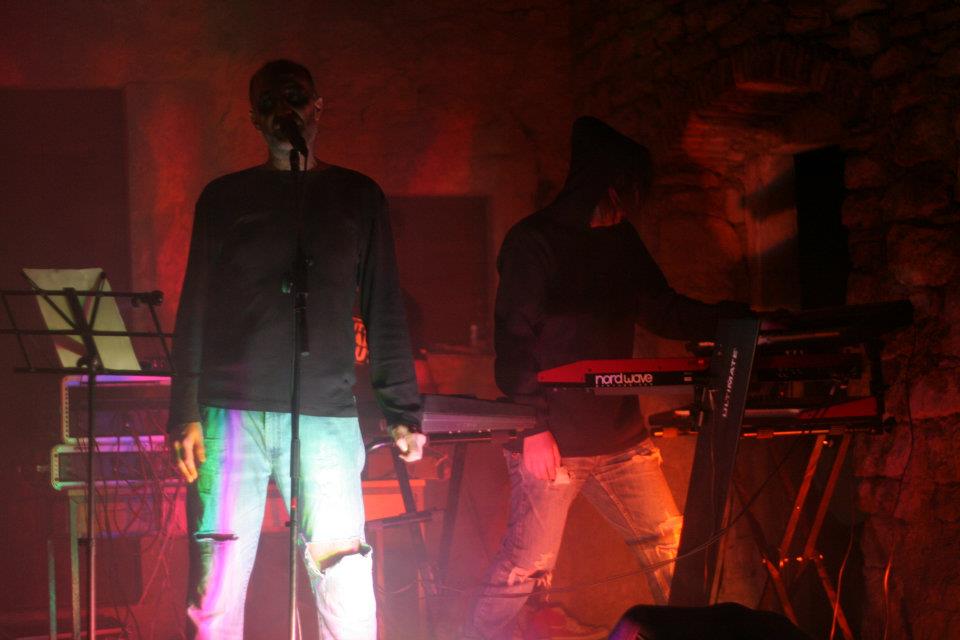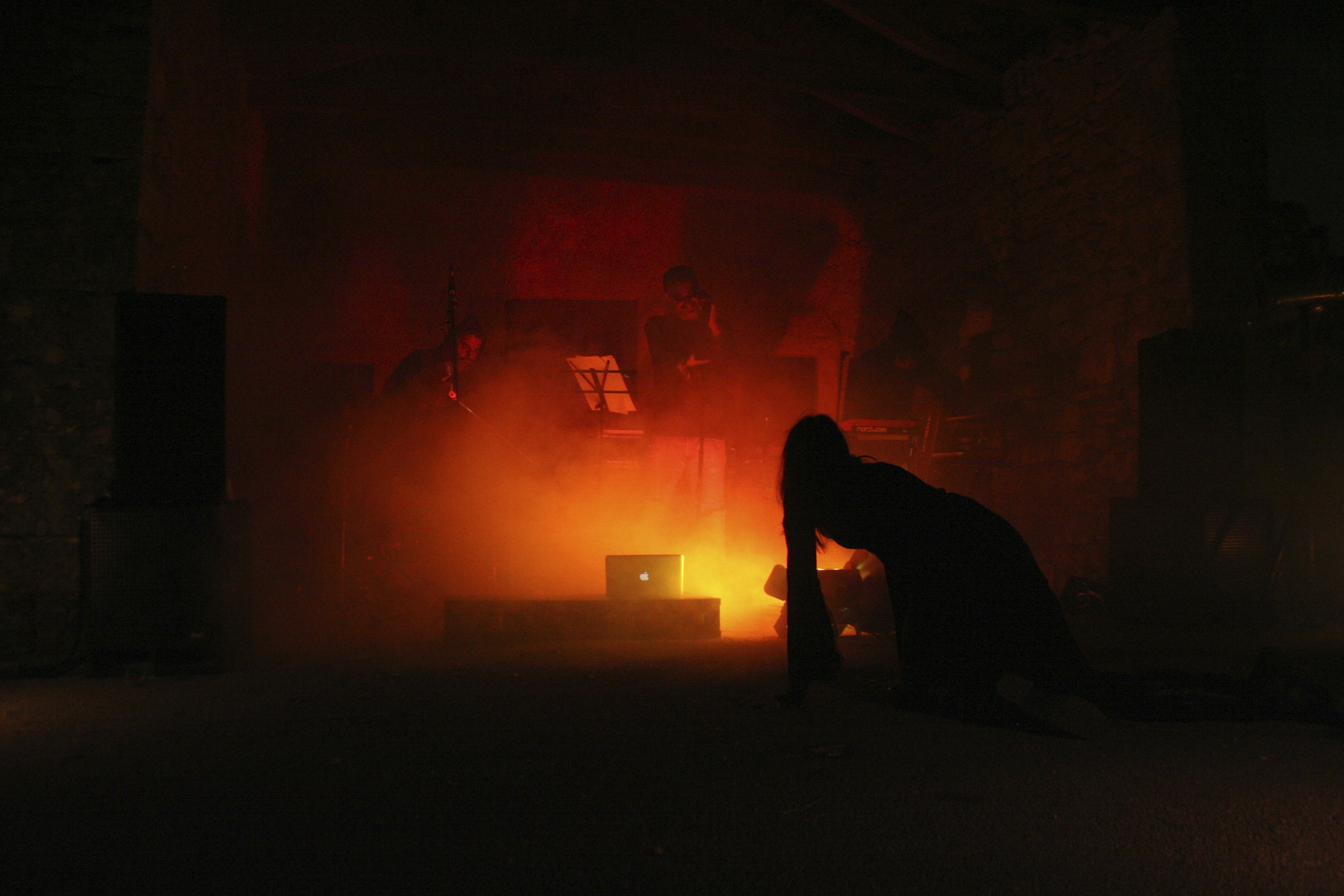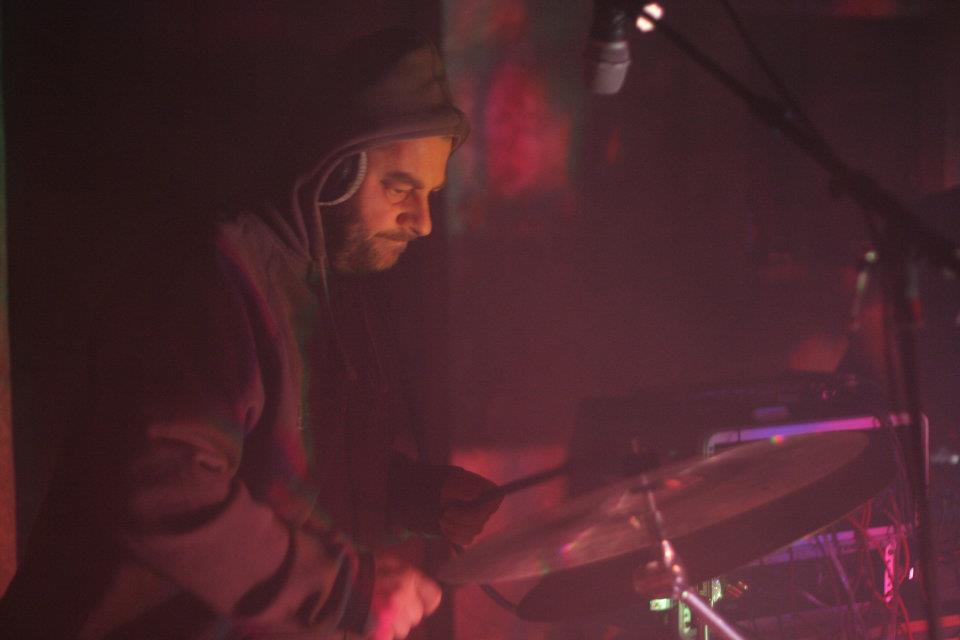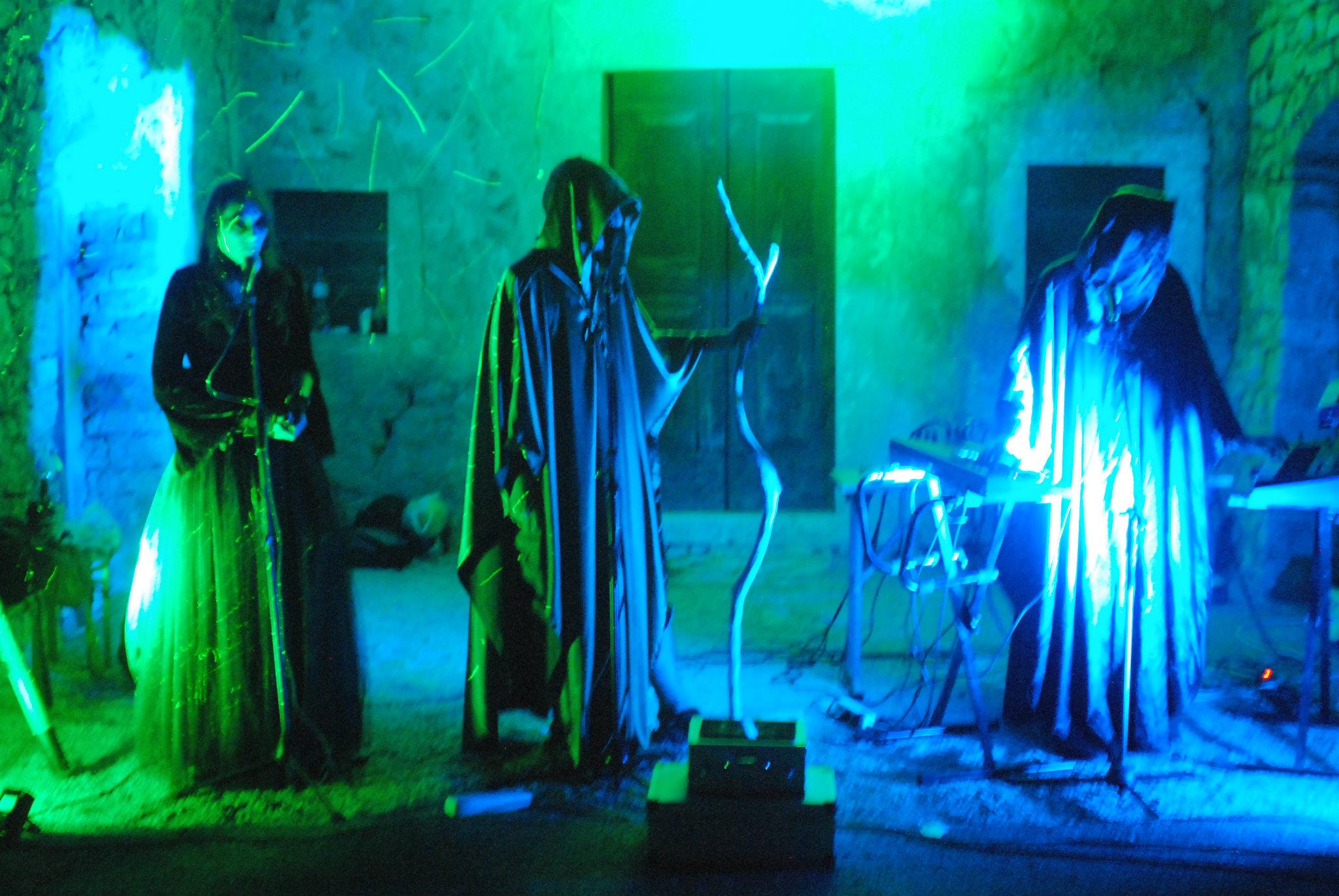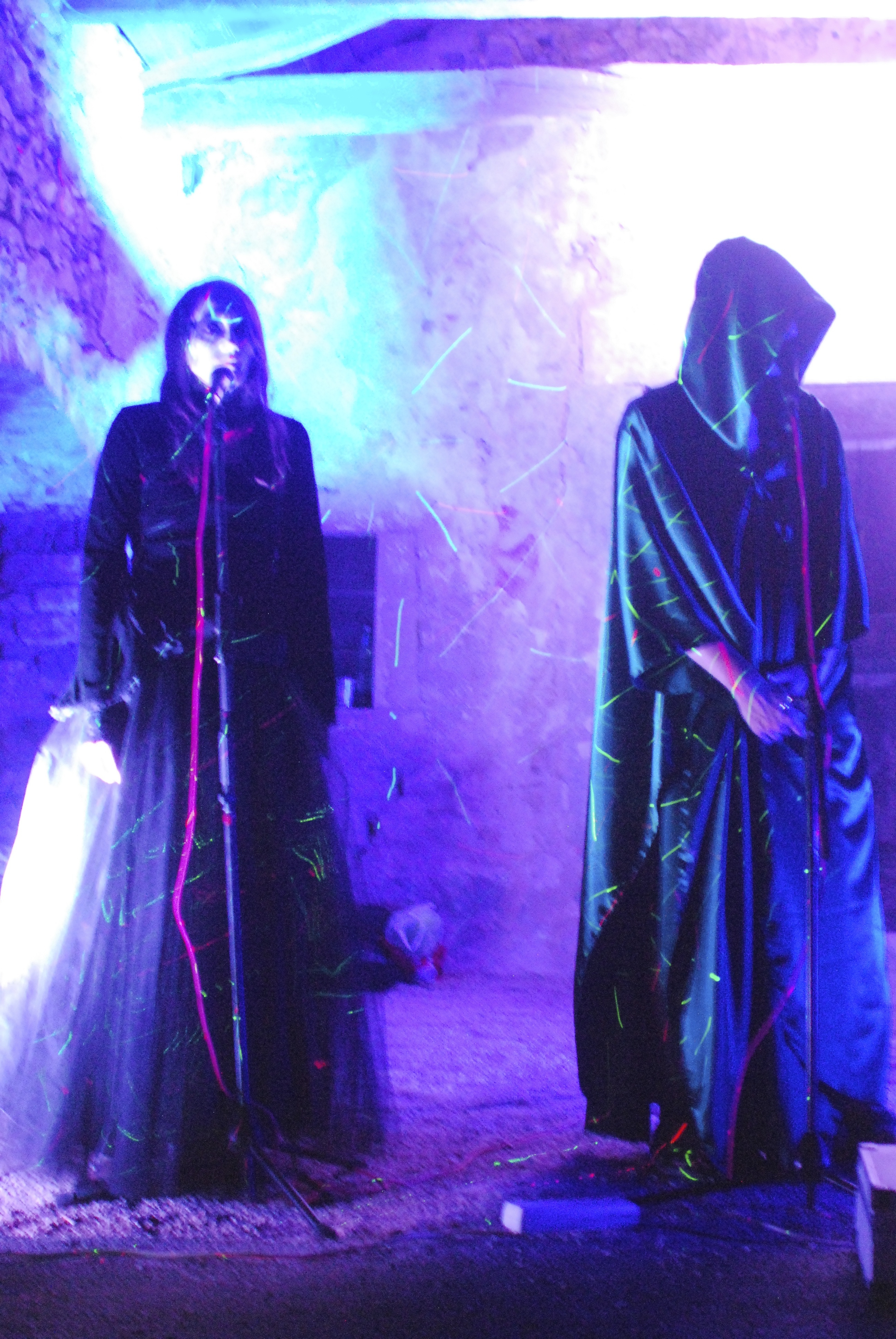Category Archives: Uncategorized
Hrvatska mlada lirika
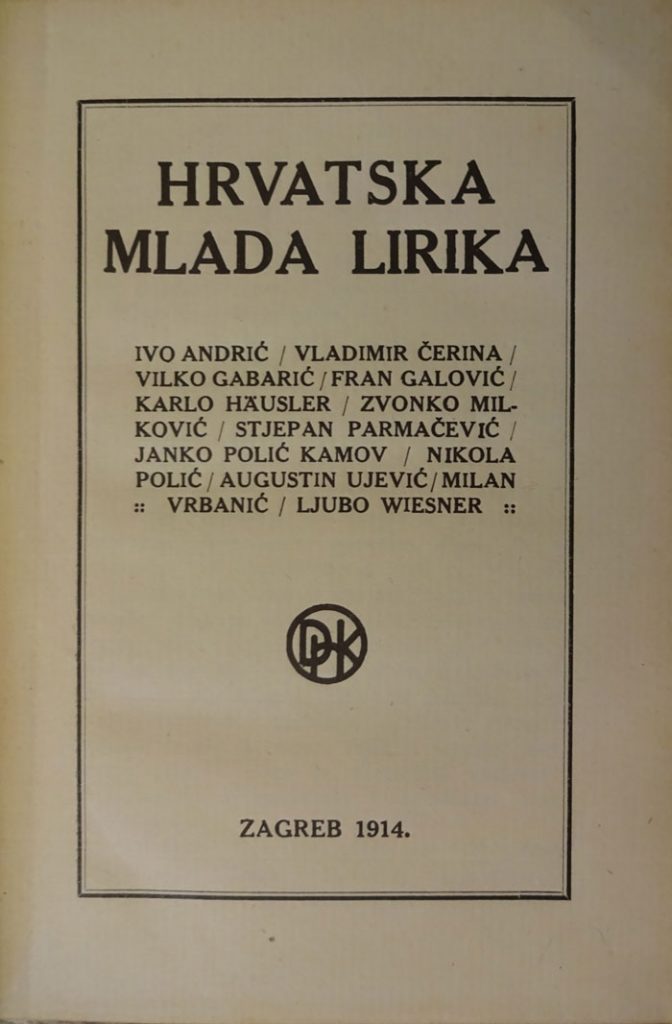 A superb new addition to my collection. An original copy from June 1914 of Hrvatska mlada lirika which features work by Ivo Andrić, Vladmir Čerina, Vilko Gabarić, Fran Galović, Karlo Hausler, Zvonko Milković, Stjepan Parmačević, Janko Polić Kamov, Nikola Polić, Augustin Ujević, Milan Vrbanić and Ljubo Wiesner.
A superb new addition to my collection. An original copy from June 1914 of Hrvatska mlada lirika which features work by Ivo Andrić, Vladmir Čerina, Vilko Gabarić, Fran Galović, Karlo Hausler, Zvonko Milković, Stjepan Parmačević, Janko Polić Kamov, Nikola Polić, Augustin Ujević, Milan Vrbanić and Ljubo Wiesner.
Antun Barac – ‘Fiume’ in English
‘Fiume’
(passing impressions, July 1919)
by Antun Barac – translated for the first time by Martin Mayhew
Three beautiful, sunny, autumnal days. I don’t know what happened. In a single morning all the ties snapped, that were holding the voice in the throat, that loosened the links, that were chaining the feet, the heavy and rigid mask fell, that was hiding the face. A quiet whisper, which spoke curses and revealed a howl, scattered itself like a wild, holy cry of joy, whilst a hand, a pathetic hand, taught to give a servile and official greeting, extended for the first time in a bold gesture of belief and confidence in itself.
We went onto the streets, in processions, assemblies, groups and we sang and cheered. And everything was so sunny, bright and light. And everything was clear and cheerful and happy in the beautiful, clear autumnal day.
In the barracks there were soldiers, and they were cheering. In the hospitals there were wounded, and they were singing. The soldiers came out onto the streets and were firing their guns. After four blurry years it was the first time that the firing meant joy, after four sombre summers it was the first time that a bullet didn’t mean death, but life. And it was as though that shot, which was now rising into the air, was a symbol, as it rises and as it falls.
On the chests flowers and tricolours. In the windows flowers and tricolours. On the streetlamps, on the telephone poles, on the makeshift stands flowers and tricolours.
In a red, white, blue, green colour, in the grey colours of joy, ecstasy, hope and belief, on each flag, that flutters, of elation, love, sympathy and adoration, which the flag as a symbol means. In the red glow of love and brotherhood towards everything and everyone, in the whiteness of the cleanliness and sublimeness of ecstasy, hope in the new world, that was being created.
We went out onto the streets and sang. We welcomed the foreign troops and sang. We threw flowers and sang. We welcomed ships from foreign countries and sang. “Call out, just call out… Viva la France! Allons enfants de la Patrie!…” And the children of the homeland arrived, and laughed, and danced, and cheered.
“Here people just walk around and cheer and sing” – they say, wrote home one French sailor. “Viva la Yugoslavie!” His compatriots cheered – and in their scepticism and in their laughter for the sake of laughing and joy for the sake of joy we felt the first stab of disappointment and misunderstanding.
In an isolated corner an old hunched over woman was sobbing. “Woman, why are you crying?” – asked a voice – I don’t know whose, and I don’t know where from. “In every joy there is a note of pain, in every laugh a seed of sorrow”, as though replying to somebody’s voice – who knows whose, who knows where from?
Three beautiful, clear, sunny, autumnal days. Three days of song and clamour and ecstasy. And then – armoured cars, machine guns and horses on the cobblestones and pikes, stretching up high, rigidly, arrogantly. In the port heavy ships with cannons aimed at the city, on the street assault troops with helmets, rifles, knapsacks and ammunition belts.
Three beautiful, clear, sunny, days passed. And nothing to show for them. Only a difficult, long winter with clouds. Just a cold summer with raindrops, that with the ‘bura’ and rain even the tears froze. Just a gloomy spring without light or sun.
Maybe a time will come, when all the ecstasy and elation will seem ridiculous to us. Maybe a period will come, when every sense will be reduced to a mathematical or chemical formula. I only know, that even then, when I was in the height of national fervour, I felt no desire for revenge or hatred or malice – the days of the greatest joy were days of forgiveness for everything, to all who had oppressed us, days of national liberty, a time when love for everyone was the most lively, the most conscious. And in those days of intoxicated delight and love, that had boiled over, the clenched fists, clashes and attacks were the end of everything.
I don’t know what happened. In just one day with a wild roar they began to tear down the tricolours of red and white and blue, and in the windows, on the streetlamps, the houses, the buildings, the churches suddenly others appeared – red and white and green, with a star and a coat of arms. Everywhere the coat of arms and everywhere the star, and everywhere fanatic hatred in the faces and fury and poison in the looks. “Italia o morte! Fuori il straniero!” Whilst the straniero thoughtfully stops and thinks: “Who in fact is the stranger?”
In these sombre days of waiting and incertitude, desperation and zeal, it is so difficult to be alive and carry all the heavy burden of the present; however it is hardest to be human. So many times I have felt the pain and burden of life, but the worst thing was when I felt the aching shame, I didn’t feel fear for myself, but for those who persecuted us, the shame of man, that chaotic, disproportionate mixture of beast and god. The beast, wild, brutal, vicious, kicking and rearing up, and the god, sublime, the ashen sceptic levelling with it, taming or incensing it. And in the battle of animal with god like the battle of a bull with a toreador – the white, red, blue, green colours, that they have signifying a symbol, they stimulate it, intoxicate it, they extol it, bring it to an ecstasy of madness and rage. Fiume, the yellowish-grey, deceitful animal, from the eyes of which peer the envy and intoxication of excessive enthusiasm, throws itself, snapping, howling and moaning into exhaustion, until it falls bewildered, unconscious to the ground.
Therein the roar is so quiet! Therein the crowd is so uneasy and lonely. In this racket our steps reverberate so eerily. Oh, the whole of this city, whose number of inhabitants doubled in a few months, as it turned into a huge, grey, isolated monastery, where the shadows succumb to the wolf, hollow songs reverberate and the voices of muffled prayers drone. And thus it is miraculously quiet and in the murmur, so terribly calm in the constant throng.
Why call this city Rieka, when it is – Fiume. Reka, Rika, Rieka – that sounds so sweet, placid and childlike like the nostalgic “ca” and “ča” of the people of Drenova, Plase, Trsat, reminiscent of the sunny gleam of the stone walls and enclosures scattered with rocks and brambles, amongst which, in spring, blossom such beautiful and fragrant violas, a modest and shy flower. It is a city with a filthy physiognomy and with an inner self bland and murky, like the murky Fiumare canal, the dead water that cries for it. The Fiuman is a separate race, not belonging to any one nation. It is a mixture of everything that has come to this merchant city to trade – of everything, of many things. The Fiuman is both an Italian and a Yugoslav – an Italian, born of Yugoslavs and brought up as a Yugoslav, who cheers at the top of his voice: “O Italia o morte!”, the Yugoslav is a quiet and timid beast, hiding because of his interests of his national origin with a neutral, inexpressible, merchant’s sneer. Whilst the Riečanin, Recan, Ričanin – they are the masses – they are the nameless mass, who don’t ask, quantité négligeable, they are the inhabitants of the workers’ houses, basements and attics, the servants and labourers, small artisans and assistants, the masses, who have only one head, and who would, maybe, with just a single blow fall. And that is the characteristic, external image of the city – Fiume, Fiuman. And in this fatal exchange is the source of all the illusions, all the efforts and all the miserable disappointments.
Years and years of timid and quivering yearnings for the city of Kvarner and in that name I will stop with everything, that was the dearest and utmost in life – but then the bloody realisation, that it was all just a yearning for childhood, for the sea, for the days that had gone forever. Yet there is no city, there is no childhood and there is no sea. There is only Fiume and Gomila and Fiumara – a murky, stagnant mire, like a feeble residue of exacerbated human passions, without the strength that it vanishes, without the strength that it stirs up, rises, moves.
Corso. An evening stroll. In the looks a glow and depth, in the gestures a yearning and yielding to love. Yet the whole city seems to shiver from one single deep gaze, which rises from the bottom of the soul and seeps into the bottom of the soul, and the whole city seems to twinkle from love, that is only the soul, only the soul. Whilst down, in the depths, inside – ah, there is no soul and there is nothing, the base and desolation and emptiness. And the whole of this city and all these people who rousingly speak and shout and wave – the whole of this city has no soul, and everything, that moves it, is the basic animal life. And its voice is not the sublimeness of ecstasy nor the size of reproach – everything is just a roar, clamour and mania. And the moment will come and everything will boil over and everything will disappear, what froths up and what rises up – on the empty bottom will remain just Fiume, a city without a soul and without physiognomy and a notion without features.
Over five bloody years ten times in the memory of the sparseness and irritation of the nerves the city howled and ten times they changed the inscriptions and ten times in a fanatical irritation the masses passed over their old idols. Today on the ruins of everything, a fiery rage triumphs in the proud satisfaction, that with the greatest lie it refuted thousands of its little lies and that in the deafening cry it suppressed everything, that protests, that rebels. Because that cry is not a lie, because this fire of enthusiasm isn’t hypocrisy. It is Fiume and everything is Fiume. And to whomsoever this Città di San Vito belongs; whosoever flag will flutter next to the double-headed eagle with the yellow-blue symbol – will win, I’m afraid of Fiume, and with a shout of honest enthusiasm the malicious cry of a lazy and cunning animal will intervene. And that is my fear and it will be a drop of bitterness in that moment, which we will surely never live to see.
What can enthral a man in this city, in which culture and supremacy are denoted by the black marks on the walls and the holes in broken inscribed tiles? In our weakness for it there is a weakness towards one’s own past, which is contained in these pavements, street corners and quays, a weakness towards the whistle of departing steamships and the whiteness of unfurled sails, that awoke our childlike imagination and tied it to this place, that doesn’t love us. In our trepidation towards its destiny there is only the fear for those miserable, unknown, oppressed thousands, who just silently accept the blows and ridicule and the stamp of inferiority. We understand that the sinful must repent the sins and perform penance those, who have deserved it. However what did the little pale children commit that they must suppress their voices in their throats, the only one with which they are able to express the feeling of happiness in the joy and drive of wickedness in the game?
Our feeling of attachment with this city isn’t a feeling of love, but a feeling of pain, and fear, and hopelessness in the sense of a wounded animal and disgust and revulsion. Because it is just Fiume – and Fiume is not an organism, not a concept, not a soul, but something colourless and tepid and tensile, that with its odour tears at the nostrils and throat, and intoxicates and commits evil. And here nothing enthrals and here nothing is attractive. The love of this city – ah, it is an illusion, it isn’t love, but an escape from it, an escape to the blueness of the sea, the sigh of Trsat, the greenery of Opatija and Volosko and the serene vistas towards Kostrena, Omišalj, Cres and Ika. Everything that nature has warm and soothing and soft, is gathered around this city, to shield it, to protect it, to conceal it. And the reason why its poison didn’t act. In the moment when the heavy shackles fall from the chests and from the legs and from the hands and from the tongues, from all sides pale children will rush and shower it with flowers of love, forgiveness and it will forget all the insults, all the blows and all the threats.
From Školjić to Kantrida – one and the same street and one and the same image: houses without expression, without style, stores, shop windows, markets. In the place where there is only trade, all the houses are built on clear commercial principles: with the least expenses – the highest rents. Houses without physiognomy, without souls. In the city, where everything is measured purely in monetary measures, the friars had also taken advantage of the few metres of free space around the church and built umpteen little rooms for shops. Trade is not permitted in the temple, however it is better in front of and around the temple. The city of fifty thousand inhabitants did not give up one single man, whose name would be recorded in the history of culture and art, and wishing to somehow christen their streets, the fathers of the city were having to reach back for names from the mother countries: of Hungary and Italy. In a city of fifty thousand souls there is not one monument, and the only highpoints on the streets are advertising posts and lavatories – as unintentional symbols of it, as if it is the only purpose in this place. I love and appreciate trade as a means, but as soon as it becomes the meaning of life, it becomes both the negation and profanation of all higher values. And that which people would have to make them happy, to lead them ever upwards, throws them ever lower. And Fiume is deep, so deep.
Amongst its great evidence for being Italian the supremacy of Italian culture is prominent in Rijeka, the culture of the Italian is greater than that of the Yugoslav. Whilst the first glance at this city shows that it has, in general, no culture, not only of its own, but no culture of any kind, and that, which in the moment could deceive the eyes, is just glued on, that is easily washed-off by the rain or over night, when the city’s new generation is over-patriotically disposed.
The fun fairs, public houses, buffet bars, cafés, cinemas. All dirty, all abandoned, all in disarray. The dirt of the port as though it passes into the city itself, into every corner, every alleyway. This relatively large city is not capable of supporting a permanent theatre, whilst the companies, which are hosted here for a month, twice a year, can only be supported by the subscriptions of Yugoslav misers. In the place, where all the sights are just negative assets, such are the values and the two most important characteristics: Rijeka’s Gomila and Rijeka’s street gangs. The heart, the centre of the city, consisting of ancient ruins, disgusting mansions with narrow and winding streets, where the sun never reaches and where streams of undignified liquids flow freely; dangerous, dark corners, smelly inns, and women, and beggars, and drunks. While Rijeka’s street gangs they are a mighty gutter army, an abandoned mob that attacks the schiavi, that fights selflessly and fervidly for the lofty goals of the city’s fathers and less selflessly, for the needs of life. And that is – Fiume.
In the days of liberty, in the days of the universal love of forgiveness, a grey monster howled, that calls itself Fiume, with a howl of hatred and revenge. In the days, when kisses and expressions of brotherhood should have rained down, it prepared itself for secretive bites, punches and stabs. And why wasn’t the punch stronger, that is just the deceitful cunningness and feeling of weakness alongside all the abundance of gesticulation.
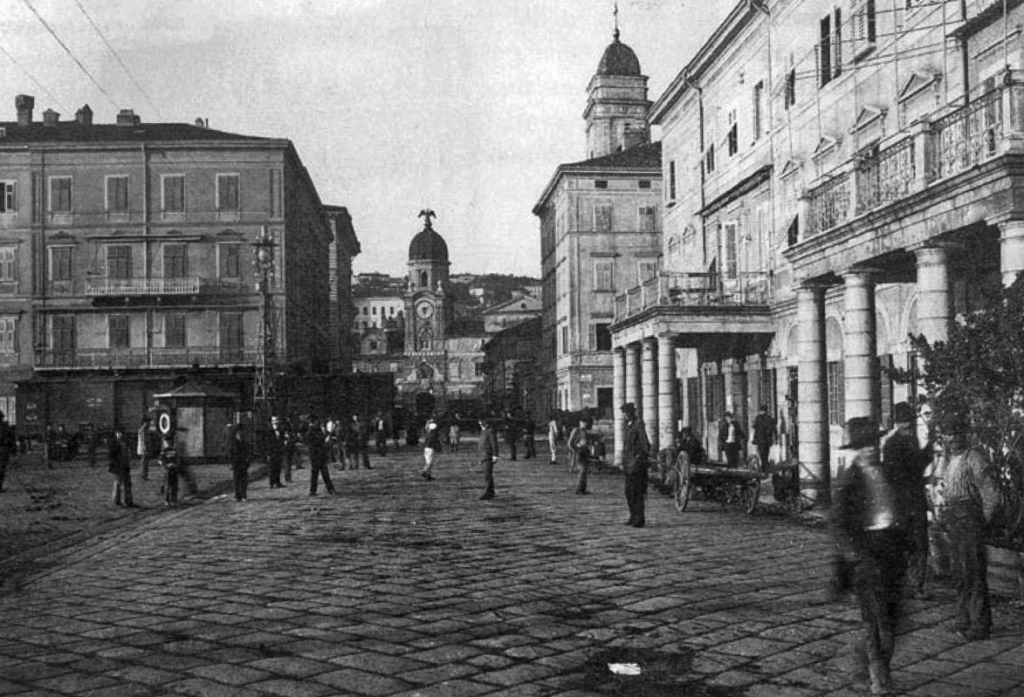 Is this city ours? Ours are those thousands and thousands of silent beings, who resignedly just wait, eternally waiting, thousands unarmed and unlawful, who upon the punch and the bite correspond with a speechless look, who upon an energetic nod from their masters sign up dutifully and without opposition, not asking: “Where to?” – It doesn’t matter, what they’re called. In the ascertainment of their anguish there was the justification of a love for them, from their speechless mouths comes a call for resistance, for rebellion, for liberation. And that is why, as their national consciousness is not strong, as the term of Yugoslavism has not developed in them yet, their pain is even stronger: it is the consciousness, that despises them, that brands them without reason, without cause, that they oppress the concept of man in them. Yet theirs is the main feeling, the feeling of shame, that they belong to a common creed unlawful, powerless, weak – and with the sense of the joy of life is mixed some dreary feeling of their own inferiority, a state of neglect before the mighty.
Is this city ours? Ours are those thousands and thousands of silent beings, who resignedly just wait, eternally waiting, thousands unarmed and unlawful, who upon the punch and the bite correspond with a speechless look, who upon an energetic nod from their masters sign up dutifully and without opposition, not asking: “Where to?” – It doesn’t matter, what they’re called. In the ascertainment of their anguish there was the justification of a love for them, from their speechless mouths comes a call for resistance, for rebellion, for liberation. And that is why, as their national consciousness is not strong, as the term of Yugoslavism has not developed in them yet, their pain is even stronger: it is the consciousness, that despises them, that brands them without reason, without cause, that they oppress the concept of man in them. Yet theirs is the main feeling, the feeling of shame, that they belong to a common creed unlawful, powerless, weak – and with the sense of the joy of life is mixed some dreary feeling of their own inferiority, a state of neglect before the mighty.
Whatever happened, whatever the fate of this city, I will not complain and I will not pity those, to whom the street corners, the banks, the ships and the warehouses belong. Alongside all of their Yugoslav tricolours, were also the Fiumani, and in their pre-war silence and chivalrousness were hidden the subterfuge and calculating attitude of the merchant, who goes just for the money. I won’t grieve for them nor for the legion of those, who over three lovely autumnal days cheered, sang and carried banners. I will only grieve for the pale little people, as their half-spoken “ča” chokes in the instinctive fear before the sharp glance of contempt and superiority…
Long, difficult months of waiting. Events, attacks, parades. Soldiers, soldiers, soldiers. Italians, French, Americans, English, Indo-Chinese. Ships, automobiles, aeroplanes. Carabinieri, bersaglieri, granatieri. Infantry, sailors, lancers, gunners. Crowded and mixed and multi-coloured. Smugglers, detainees, fugitives. And the inns and basements reverberate and glass shatters and girls scream, and blood, wine and champagne flow. Fiume goes crazy and howls and rages.
Yet that’s what it wanted and so sullenly and so sombrely. Like the shadows we loiter only around the corners and we disappear in the corners. Whilst the sun stings and the truth stings. However, the shame against man stings the most of all, for man, as he oppresses his own brother. Of all these people of various colours and uniforms the most likeable are the Annamese (Vietnamese from the French peacekeeping forces), yellow, silent, mysterious, calm creatures with a sick nostalgia for the East and a blunt lack of understanding for all of this colourful, noisiness and craziness. Why are they here and for what use is the secret, eternal pain for the motherland? The same feeling in them, that they protect us, and in us, that they protect. A feeling of pain, shame, submissiveness, disgrace.
Mornings and afternoons and evenings pass. And nights fall, long nights without sleep, when below the windows the hooves of horses clatter as they pass by, heavy cannons boom, the steps of soldiers reverberate. And the city stays silent and the river stays silent, and the sea, in a troubled uncertainty. Just above the houses glimmer the large, light letters: Viva Fiume italiana! And the shining sign and the shining star, so that the brothers can see on the other bank. And they in despair and hopeless expectancy hide their heads amongst the pillows, so they see nothing, so they hear nothing, so they feel nothing. And everything is dead, rigid, uneasy. And everything is sleepless yet in a dream, without a break, without rest, without peace, without joy.
It just sleeps like a fatigued beast, dreaming maliciously and in that sleep of new bites and stabs, the grey formless masses, Fiume sleeps, a city without soul and without physiognomy.
*******
Sva prava pridržana / All rights reserved.
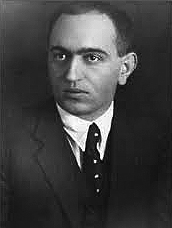 Antun Barac (1894 Kamenjak near Crikvenica – Zagreb 1955) was an important literary historian and writer, who was an advocate for the publication of Janko Polić Kamov’s works. In 1917 he established the influential publishing institute ‘Jug’ in Zagreb with other writers. Amongst the books they planned to published was Kamov’s only novel Isušena Kaljuža written from 1906-1909, but this never happened.
Antun Barac (1894 Kamenjak near Crikvenica – Zagreb 1955) was an important literary historian and writer, who was an advocate for the publication of Janko Polić Kamov’s works. In 1917 he established the influential publishing institute ‘Jug’ in Zagreb with other writers. Amongst the books they planned to published was Kamov’s only novel Isušena Kaljuža written from 1906-1909, but this never happened.
Barac spent the unsettled period after the First World War from 1918-1924 in Sušak (the eastern part of today’s Rijeka) working as a professor at the secondary school. During this period he wrote this short, stark, even poetic essay Fiume, in which he describes the unpleasant events and experiences in the city of Rijeka at the time of the arrival of foreign peace-keeping troops whilst the city’s fate was being decided in post-war negotiations, and just upon the eve of the arrival of D’Annunzio and his soldiers. It is interesting to note that Barac was most likely reading the still as yet unpublished manuscript of Kamov’s Isušena Kaljuža during this period and that it may have influenced his writing of Fiume. This text was first published in the journal Njiva in 1919.
Barac was also the originator of the idea to publish a collection of the complete works of Janko Polić Kamov, which finally saw the light of day from 1956-1958, amongst which the novel Isušena Kaljuža was printed for the first time almost 50 years after Kamov wrote it.
Thanks to Igor Žic
Common English translation mistakes
As I work as a Croatian to English translator and proofreader I spend great amounts of time reading a multitude of texts for all and sundry. From simple tourist brochure descriptions of resorts and campsites to intensive scientific and academic papers about language, the arts and history.
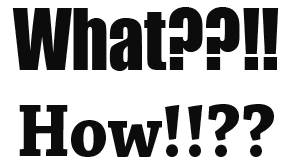 Since starting in this business in 2004 I have seen and read some terribly and some excellently translated English texts but there are many errors, misspellings and grammar mistakes which translators from Croatian to English make which will instantly pinpoint them as not being made by a native English speaker, or that the text hasn’t even been checked by a native English speaker.
Since starting in this business in 2004 I have seen and read some terribly and some excellently translated English texts but there are many errors, misspellings and grammar mistakes which translators from Croatian to English make which will instantly pinpoint them as not being made by a native English speaker, or that the text hasn’t even been checked by a native English speaker.
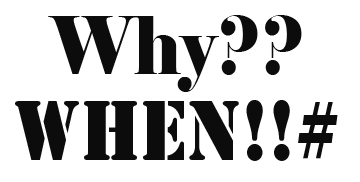 Reading a well-translated text is a breath of fresh air but when I come across something which is considered to be “good enough” or written by a client’s relative who once lived in America then my enthusiasm drops and I ask myself “why do people bother?”. Sometimes it’s blatantly obvious that the translator hasn’t even bothered to use a simple spellchecking programme!!
Reading a well-translated text is a breath of fresh air but when I come across something which is considered to be “good enough” or written by a client’s relative who once lived in America then my enthusiasm drops and I ask myself “why do people bother?”. Sometimes it’s blatantly obvious that the translator hasn’t even bothered to use a simple spellchecking programme!!
Of course, there are differences between American and British spellings of certain words – an issue that some translators seem to be unaware of. I always use British English and if I am given a mixture of texts in different forms of English to proofread I will always confirm with the client which they prefer.
These kinds of issues can be avoided by editors, project managers or clients by supplying the translator (and subsequently the proofreader) with a style-sheet, or set of guidelines, which covers all the formatting, grammar, styling and language required to make all the texts, articles, submissions from writers and contributors et al. cohesive and unified. Since working in Croatia I have never been given a style-sheet.
Why don’t businesses, tourist associations, public institutions, industry etc. make it known who does their translations? Every publisher which I have worked with has…
A note to any editors, publishers and writers please, please, please do not allow your graphic designers to manually add English text to the layout of your publications – they are not translators and are not qualified to write – so many books, brochures etc. I have translated for have been ruined by stupid spelling mistakes, most of the time in heading and captions which ultimately look bad for me because my name appears in the “impressum” imprint and credits.
So, I decided to start a list of the most common mistakes – this will be an ever-increasing list as more examples pop up…
error – correction
“loose” – lose.
„navodnice“ – “quotation marks”
“payed” – “paid”.
“informations” – “information” (there is no plural in English)
“then/than” – “onda/nego”
year format: 2014. – 2014
number format: 1.212.459,25 – 1,212,459.25
“divers” – “diverse”.
“We arrive at 2pm and meet Your friend…” – “your” or “you” are never used with “Y”, unless to start a sentence. English does not have the formal “vi” or “Vi” as Croatian does.
“sadržaji” – in tourism is not “contents” it’s “facilities” or “activities” or “features”
“advices” – “advice” (there is no plural in English)
“manifestacija” – “event” – never use “manifestation” in text about tourism.
“ponuda” – Yes it means “offer” but try to use a word more imaginative: “choice”, “selection”, “attraction”….
“bogat” – another word overused in tourist texts.
“gastronomija” – use “cuisine”, “culinary” or just “food”.
“uživati u” – not “enjoy in” just “enjoy”
“izdanje” – only if referring to a book or something published/issued – not an event!
“this” = singular – “these” = plural
“that” = singular – “those” = plural
“analysis” = singular – “analyses” = plural
“accommodations” = never plural, a mass noun – always used as”accommodation”
Sveti Jakov(b) – is not St Jacob – he is St James.
“relacija” – when concerning travel it is “route” or “line” not “relation”.
“We took a walk in the nature” – no, no, no just “nature”!
“tridesetih godina prošloga stoljeća” – “1930s” – not “the 30s of the past century”
Wien – Vienna
Beograd – Belgrade
slatka voda – is not “sweet water” it’s “fresh water”
“after job” – “after work”
MORE TO COME……
Simple tips:
1) always use an English language keyboard setting
2) always use a spellchecker
3) always ask a native English speaker to check your text if you’re not sure 🙂
Legendfest – writing and performances
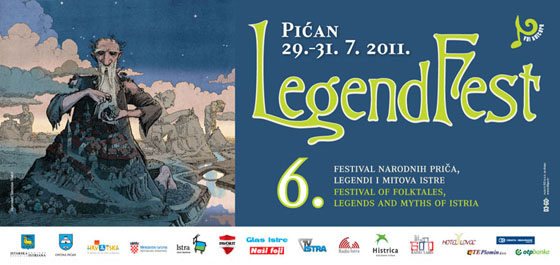 Legendfest is a three-day festival of myths, legends, folklore and live performances held every year in the small hilltop village of Pićan, in Istria, Croatia. During the festival the village becomes the backdrop for storytellers, children’s workshops, live theatrical shows, local food, arts and crafts and concerts, which draw on the rich traditions and history of Istria. Visitors have the chance to go back in time and experience anything from medieval poetry to ancient myths in the picturesque setting.
Legendfest is a three-day festival of myths, legends, folklore and live performances held every year in the small hilltop village of Pićan, in Istria, Croatia. During the festival the village becomes the backdrop for storytellers, children’s workshops, live theatrical shows, local food, arts and crafts and concerts, which draw on the rich traditions and history of Istria. Visitors have the chance to go back in time and experience anything from medieval poetry to ancient myths in the picturesque setting.
Each year the festival has a different theme. I have written and performed at Legendfest since 2011. The theme for 2011 was pirates – and so myself as author, Cyborgix 4E75 as composer and musician, Miki as orchestral composer and Jasmina Jazzy as performer, wardrobe and make-up manager, put together the audio/visual piece “Captain Morgan’s Hidden Treasure”. I played the ghost of the Caribbean pirate Captain Morgan (yes, him from the brand of rum) who, as legend says, visited the province of Istria, settled and established the real-life village of Mrgani (meaning the “place of the Morgans”). The myth recalls how he had buried his last stash of gold and treasure nearby. Our 15 minute performance was his story and how he had returned from the spirit world to Istria to uncover the location of his buried treasure after 300 years.
In our performance we were joined by Alen Tibljaš – one of Croatia’s most respected drummers, who added some extra drama to the composition. The show was held in the tiny chapel of Sv. Mihovil on the outskirts of the village of Pićan situated at the top of the surrounding cliffs – the perfect location for our dark tale of ghostly pirates and treasure.
At the end of the performance, which closed the festival on the last evening, many of the festival’s other performers came and joined us for pirate revelry and choruses of “Fifteen men on a dead man’s chest. Yo, ho, ho and a bottle of rum. Drink and the devil had done for the rest….” The audience thoroughly enjoyed it!
You can listen to the studio recording of “Captain Morgan’s Hidden Treasure” here:
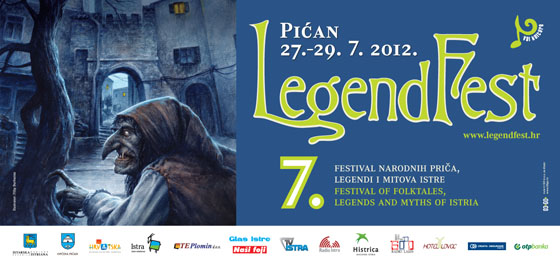 The theme for Legendfest 2012 was witches, wizards and goblins and so we delved into Istria’s rich heritage of myths, legends and folklore and wrote, composed and produced a new concept and performance – “Legend From Istria”. Based upon tales of Istrian gods I played Stribor, son of Svarog – The God of Wind and I narrated the terrible story of good versus evil to take back the land of Istria which had been conquered by the Underworld demons of Bjesomar and Morana played by Cyborgix 4E75 and Jasmina Jazzy.
The theme for Legendfest 2012 was witches, wizards and goblins and so we delved into Istria’s rich heritage of myths, legends and folklore and wrote, composed and produced a new concept and performance – “Legend From Istria”. Based upon tales of Istrian gods I played Stribor, son of Svarog – The God of Wind and I narrated the terrible story of good versus evil to take back the land of Istria which had been conquered by the Underworld demons of Bjesomar and Morana played by Cyborgix 4E75 and Jasmina Jazzy.
Svarog summoned up the help of Slavic gods Perun – the God of Thunder and Gerovita – The Master of War to defeat the two devils in a final cataclysmic battle scene which would see peace return to the beautiful land of Istria.
… you can listen to the epic story below 🙂
Once again we closed the festival programme after midnight on the last day, leaving the audience enthralled.
All rights reserved © Martin Mayhew and Cyborgix 4E75.
‘By Any Means’ – Charley Boorman in Croatia BBC tour
Britanski glumac i adventurist Charley Boorman započeo je snimanje novog TV serijala BBC i National Geographic koja će njea i njegovu filmsku ekipu odvesti od Irske do Australije. Zvijezda televizijskog serijala “Dug put prema dolje” (Long Way Down) (gdje je glumio s zvijezdom Ewanom McGregorom, Star Wars) putovat će isključivo po zemljinoj površini (zrakoplov isključen!) i na putu preći 24 zemlje i to koristeći sva moguća sredstva prijevoza – tipičnih prijevoznih sredstava za zemlje kroz koje prolazi. Na svom dolasku iz Venecije u Poreč, Charley i redatelj Russ Malkin i kamerman Mungo sreli su Martina Mayhew, Deana Černeku i Kristijana Jerčinovića (iz Rijeke). Oni su ih dočekali s automobilom Yugo Koral 45 proizvedenim 80-tih godina prošlog stoljeća kojim su se odvezli do Zagreba. Ekipa je nakon toga prešla na autobus redovne linije do Vukovara.
Charley i njegova ekipa planiraju završiti put od 27,500 km u Sydneyu, Australija početkom kolovoza.
British actor and adventurer Charley Boorman began filming a new BBC and National Geographic TV series which will take him and his film crew from Ireland to Australia in 2008. Star of previous TV series ‘Long Way Down’ (which also starred Ewan McGregor, Star Wars) travelled across the earth’s surface (no aeroplanes!) in a trip crossing 24 countries ‘by any means’ of transport – in typical vehicles of each of the countries they pass through.
Arriving in Poreć from Venice, Charley and director Russ Malkin and cameraman Mungo met up with Martin Mayhew, Dean Cerneka and Kristijan Jerčinović (from Rijeka) with a 1980s Yugo Koral 45 which Charley drove onto Zagreb in time to make a bus connection bound for Vukovar.
Charley and his crew finished their 27,500 km trip in Sydney, Australia in early August.
This scene is just outside Motovun, Istria County, Croatia.
Organised by myself in 2008.

